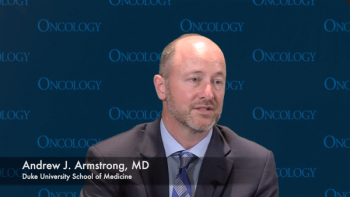
Prostate Cancer
Latest News
Latest Videos

CME Content
More News

Patients with with metastatic castration-resistant prostate cancer continued to derive notable benefit from treatment with first-line olaparib plus abiraterone acetate and prednisone or prednisolone compared with abiraterone monotherapy.

Despite the combination of enzalutamide plus abiraterone acetate and prednisolone (AAP) falling short in patients with metastatic hormone-sensitive prostate cancer, although androgen deprivation therapy plus AAP resulted in a clinically meaningful overall survival benefit.

Antitumor activity and safety of pembrolizumab plus abiraterone acetate appears to be sustained in chemotherapy-naïve castration-resistant prostate cancer.

Expert panelists consider which factors would push them toward utilizing triplet therapy in patients with metastatic castration-sensitive prostate cancer.

Centering discussion on a patient case of high-volume metastatic CSPC, expert panelists review the option of triplet therapy based on the PEACE-1 trial.

Ulka N. Vaishampayan, MBBS, discussed the potential benefits of oral docetaxel plus ritonavir in metastatic castration-resistant prostate cancer.

Phillip H. Kuo, MD, PhD, spoke about incorporating prostate-specific membrane antigen–PET imaging into multidisciplinary care for patients with metastatic castration-resistant prostate cancer.

Phillip H. Kuo, MD, PhD, spoke about the future of theragnostic imaging in patients with metastatic castration-resistant prostate cancer.

Findings from a study revealed a notable reduction in the risk of prostate cancer–specific mortality in Black United States veterans who underwent prostate-specific antigen screening, highlighting the potential importance of undergoing annual screenings in this patient population.

Shared insight on optimal patient monitoring strategies while administering therapy for metastatic castration-sensitive prostate cancer.

Shared insight on optimal patient monitoring strategies while administering therapy for metastatic castration-sensitive prostate cancer.

Investigators highlighted that when determining a treatment strategy for patients with early-stage prostate cancer, baseline benign prostate hyperplasia symptoms should be taken into consideration.

In light of the recent FDA approval of darolutamide plus docetaxel and androgen deprivation therapy in metastatic hormone-sensitive prostate cancer, E. David Crawford, MD, discussed the research that paved the way for the regulatory decision and where future efforts need to be focused.

Based on data showing that patients with metastatic castration-resistant prostate cancer may achieve benefit following treatment with olaparib plus abiraterone and prednisone or prednisolone regardless of homologous recombination repair mutational status, the FDA gave the combination priority review.

After reviewing a patient scenario of metastatic castration-sensitive prostate cancer, expert panelists break down frontline treatment options in this setting.

Patients with metastatic hormone-sensitive prostate cancer can now receive treatment with oral darolutamide plus docetaxel following its approval by the FDA.

Data from a substudy of the phase 3 VISION trial presented at 2022 ASCO Annual Meeting showed that higher standard mean uptake value by PSMA-PET is strongly associated with outcomes for patients with metastatic castration-resistant prostate cancer.

Results from the phase 3 KEYNOTE-921 trial showed the primary end points of overall survival and radiographic progression-free survival were not met despite a trend towards improvement following treatment with pembrolizumab and docetaxel in patients with metastatic castration-resistant prostate cancer.

Ian D. Davis, MBBS, PhD, spoke about updated survival results of the ENZAMET trial which analyzed enzalutamide in metastatic hormone-sensitive prostate cancer.

Radical proctectomy, external beam radiotherapy, and brachytherapy yielded comparable prostate cancer–specific mortality, while external beam radiotherapy with or without brachytherapy resulted in favorable distant metastases outcomes in patients with high-risk prostate cancer.

At 24 months of follow-up, MRI-guided focused ultrasound focal therapy was found to be safe and effective for patients with grade group 2 or 3 prostate cancer.

Enzalutamide monotherapy could be a promising alternative to active surveillance for patients with low- and intermediate-risk localized prostate cancer.

Metastatic castration-resistant prostate cancer tumors can be classified as luminal and basal, possibly allowing for a better precision medicine approach to treatment.

Patients with high-risk prostate cancer appeared to derive benefit from androgen deprivation therapy given for a minimal duration of over 18 months plus external beam radiotherapy.

Treatment with 177Lu-PSMA-617 resulted in poor outcomes for patients with metastatic castration-resistant prostate cancer whose tumors had little to no prostate-specific membrane antigen expression.












































